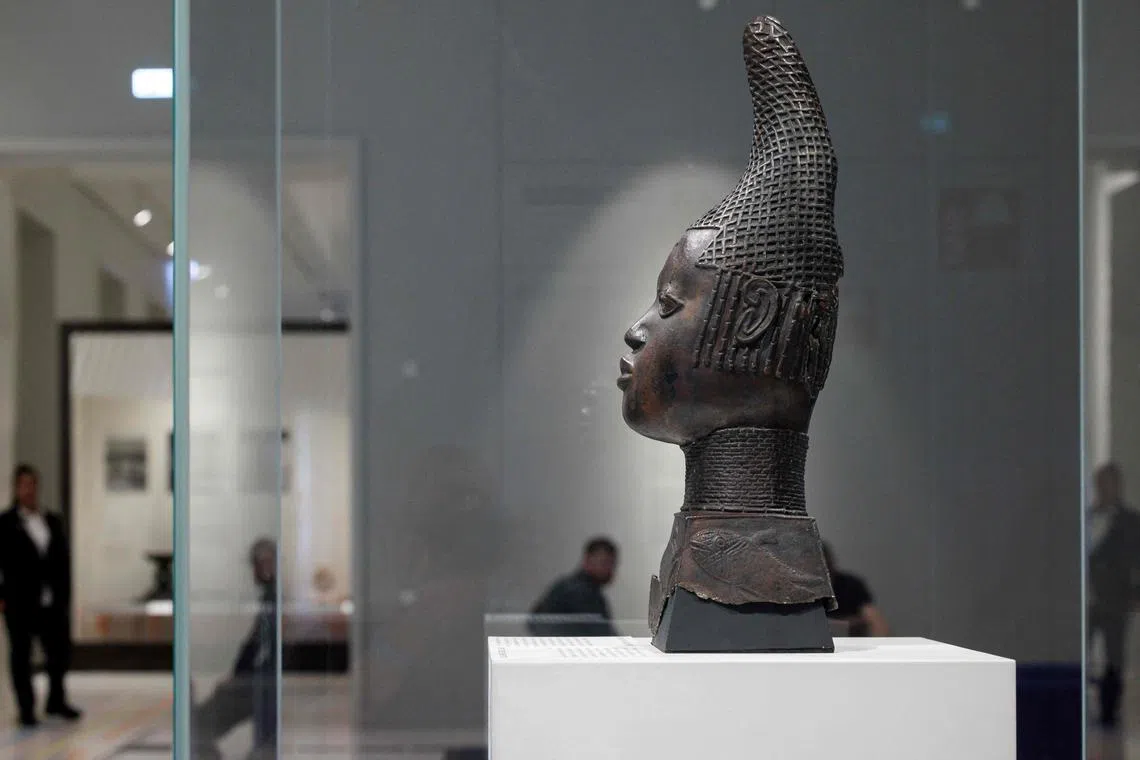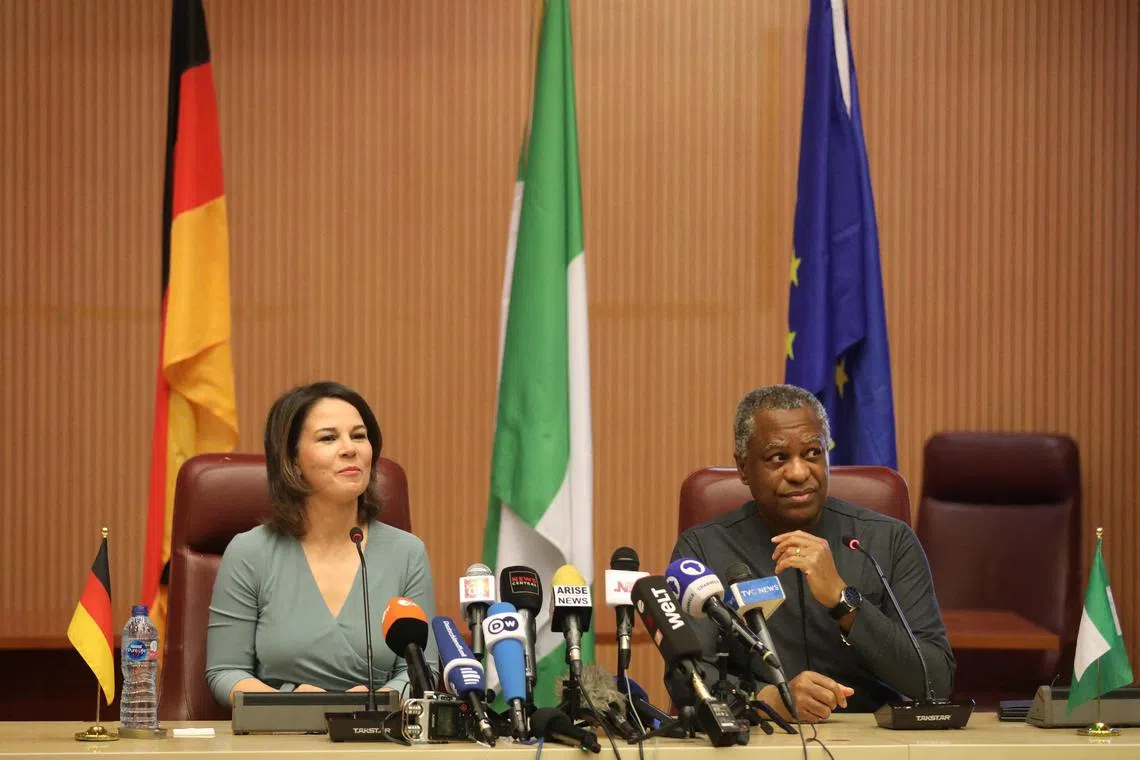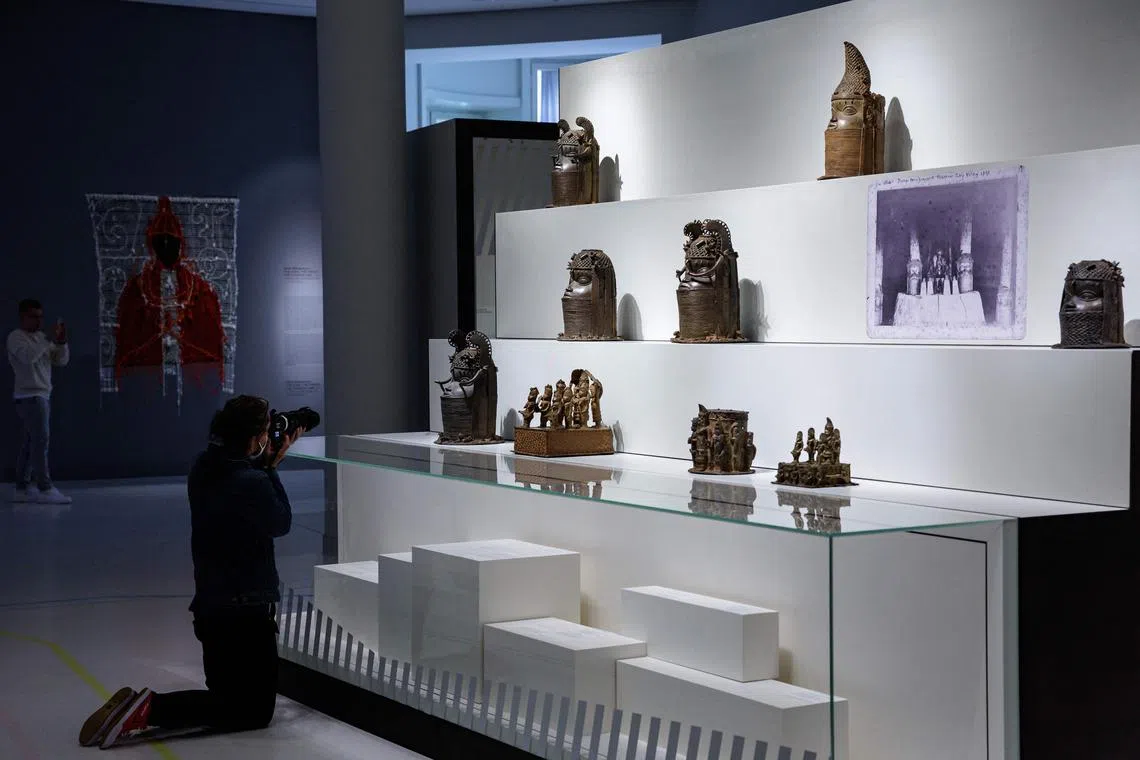Return of Benin Bronzes to Nigeria marks first step in Germany’s restitution of looted artefacts
Sign up now: Get ST's newsletters delivered to your inbox

One of the Benin Bronzes is pictured in a file photo during a press preview in September at the new Humboldt Forum in Berlin.
PHOTO: AFP
Follow topic:
ABUJA, Nigeria – When the airplane of Germany’s Foreign Minister touched down in Abuja, Nigeria, in December 2022, it carried precious cargo: Twenty Benin Bronzes, priceless artefacts that were looted in a violent raid more than a century ago, and which were finally coming home.
At a ceremony in Abuja, German official Annalena Baerbock handed the stolen items back to Nigerian officials.
“It was wrong to take the bronzes and it was wrong to keep them for 120 years,” she said.
In a legal sense, the 20 artefacts Ms Baerbock brought with her belonged to Nigeria even before she took off from Berlin.
More than 1,100 bronzes in German museums have become Nigerian property
But the handover was an important symbolic gesture and many more of the artefacts are expected to come back to Nigeria in 2023. Others will remain in Germany on long-term loan.
The Foreign Minister’s trip is the culmination of a years-long process that upended Germany’s approach to handling cultural items unjustly obtained during the colonial period.
It is also part of a pioneering model for large-scale restitution, in which ownership is swopped before any artefacts change hands.
Crucially, that approach allows for items to be restituted even if the country of origin does not yet have the facilities to store and exhibit them.
Ms Baerbock described the return of the bronzes as just the first step.
“More of these agreements will follow,” she said. “This moment is also historic to us. We are facing up to our history of colonialism.”
The bronzes consist of thousands of sculptures and plaques that British forces looted from Benin City, in what is now southern Nigeria, during a raid in 1897. Many wound up in museums around the world, including the Metropolitan Museum of Art in New York, the British Museum in London and several major German institutions.

Germany Federal Foreign Minister Annalena Baerbock and Nigeria Minister of Foreign Affairs Geoffrey Onyeama (R) during the handing over of Benin bronzes in Abuja, Nigeria, on Dec 20, 2022.
PHOTO: AFP
Nigeria has been calling for the objects’ return for several decades and its deal with Germany is the largest yet. It is also notable because the effort was spearheaded not by individual museums, but by a national government.
The items returned included an 18th-century throne stool and a sculpture commemorating a Benin “oba” or king.
This outcome had seemed far-fetched as recently as six years ago.
As in other European countries, the subject of restitution had been largely ignored in Germany until recently, and some museum leaders had been reluctant to part ways with artefacts.
The about-face was driven by a changing social consensus about the ethics of holding on to such items and further strengthened by a backlash against Germany’s flagship cultural project: the Humboldt Forum, a US$825 million (S$1.1 billion) institution in Berlin, conceived as Germany’s equivalent to the Louvre or the British Museum.
According to Mr Andreas Goergen, secretary-general of Germany’s Federal Culture Ministry and one of the architects of the restitution agreement, the deal was also a testament to a careful, incremental strategy, which he contrasted with a flashier approach by France.
During a visit to Burkina Faso in 2017, French President Emmanuel Macron gave a groundbreaking speech in which he pledged to make returning unjustly acquired items to African countries a top priority.
Although some objects have been given back, the French effort has floundered – in part because museum objects are property of the French state, meaning Parliament must sign off on transfers of ownership.
“Mr Macron took the very French route: a great speech by a great president, then it takes years for reality to match those words,” said Mr Goergen. “We are operating in a German way. It isn’t especially sexy, but it can be efficient.”
Germany’s approach also contrasts with those of the United States and British governments, which have left decisions up to individual institutions.
Yet, some of the most important museums in Britain cannot return their Benin Bronzes, even if they wanted to, without a change in the law. That includes the British Museum, which owns about 900 of the artefacts.
According to officials in Germany, a key turning point there occurred in 2019 amid growing public pressure.
It was partly spurred by Mr Macron’s speech and a rising awareness in Germany of its own colonial crimes – including the killing of tens of thousands of Nama and Herero people in what is now Namibia.
The atrocity, carried out between 1904 and 1908, is widely seen as the first genocide of the 20th century.
Even as the Germans began moving towards restitution, obstacles remained on the Nigerian side. Although the country had requested the return of the bronzes since the 1970s, there was conflict over who would take ownership of the artefacts.
Both the Nigerian government and the oba of Benin, whose family ruled the historical Kingdom of Benin from which they were looted, claimed that they owned the items. Mr Godwin Obaseki, governor of Edo state, where Benin City is, said he acted as a facilitator to resolve the dispute.

Sculptures known as the Benin Bronzes on display at the new Berlin Palace Humboldt Forum ahead of the exhibition’s opening on Sept 15, 2022.
PHOTO: AFP
Nigeria lacked the facilities to safely store and exhibit the delicate items.
Nigerian financier Phillip Ihenacho said that in 2019, Mr Obaseki had asked him to find a solution to the country’s “deficit in museum infrastructure” and that there was pressure from the German end.
Ultimately, he said, the oba’s family, Nigeria’s museum commission and the government of Edo state agreed to join a trust together, with independent directors that oversee the construction and operation of the new museum.
Officials in Benin City hope the return of the artefacts and the construction of the Edo Museum of West African Art will herald a cultural revival and a boom in tourism. Mr Obaseki said its effects would ideally resemble those of the Guggenheim Museum in Bilbao, Spain, which is credited with transforming the fortunes of that formerly gritty port city.
Mr Ihenacho, however, made it clear that the bronzes’ return brought with it a new set of practical challenges for Nigeria.
It remains unclear who will pay for the shipment and insurance of the remaining items in Germany, and he noted that the bronzes’ storage and upkeep will come at a considerable cost, including electrical bills for climate control.
“To the West, this story is very much about the return of the Benin Bronzes,” said Mr Ilhenacho, “but for most Nigerians, this is the beginning.” NYTIMES

